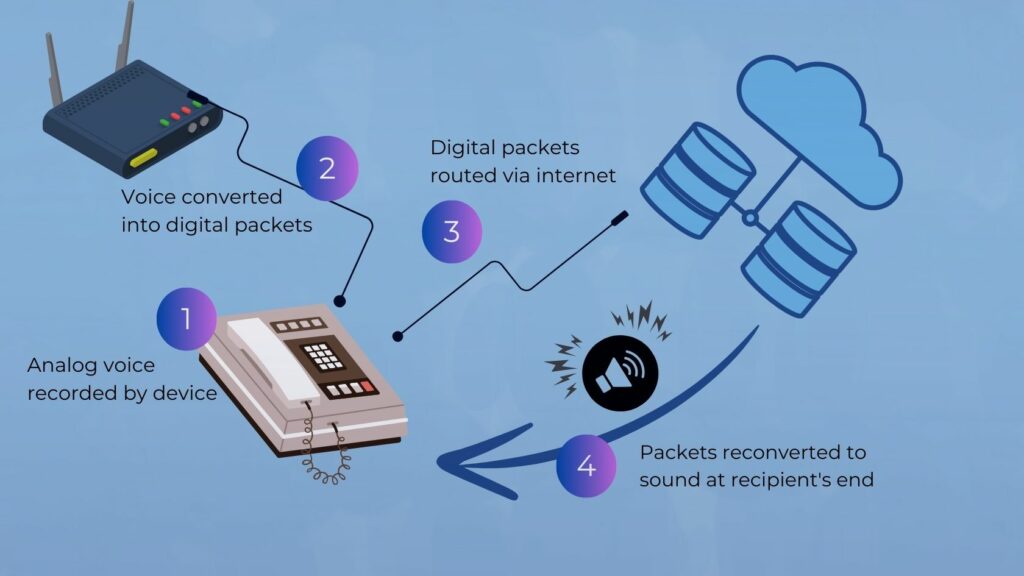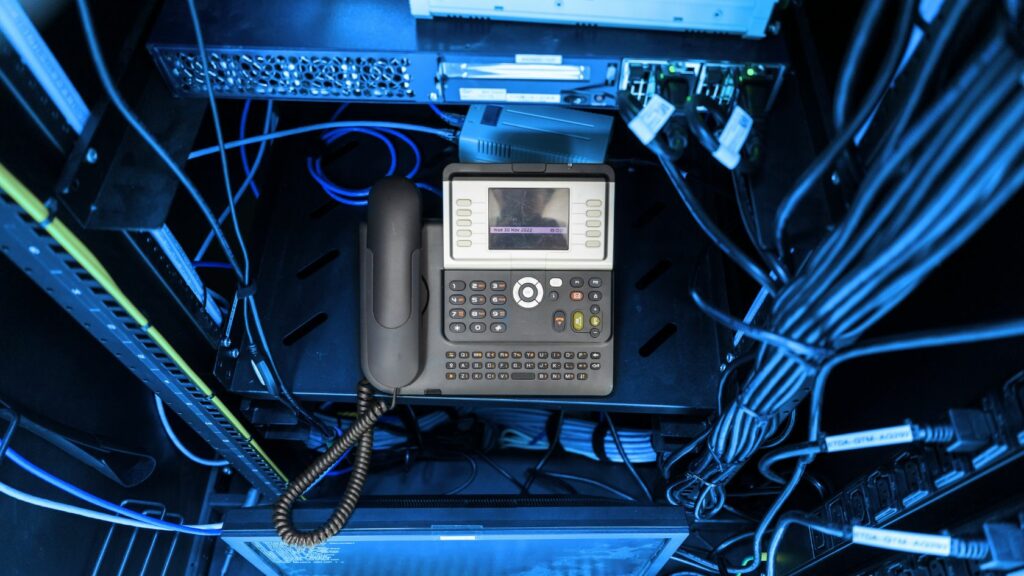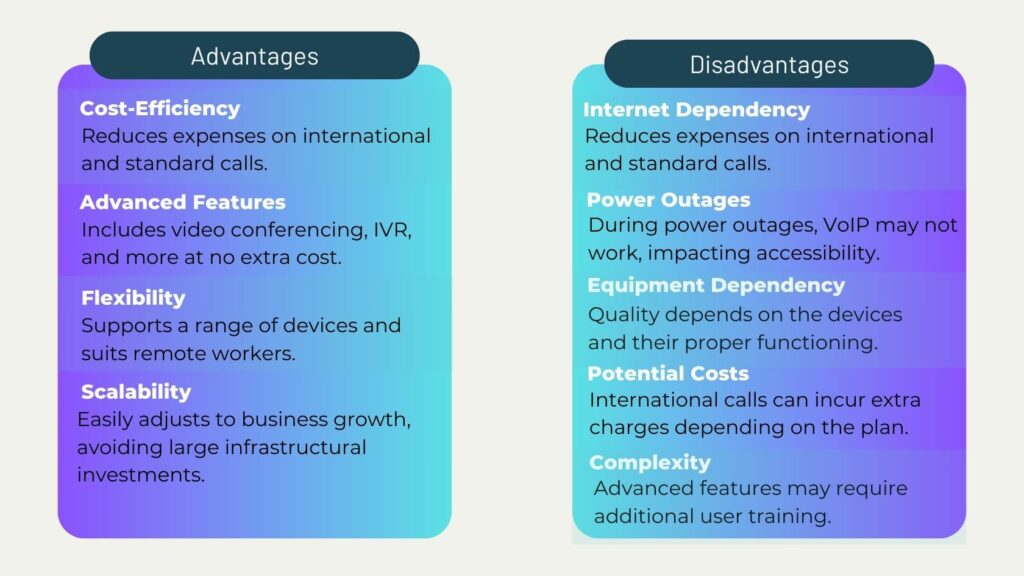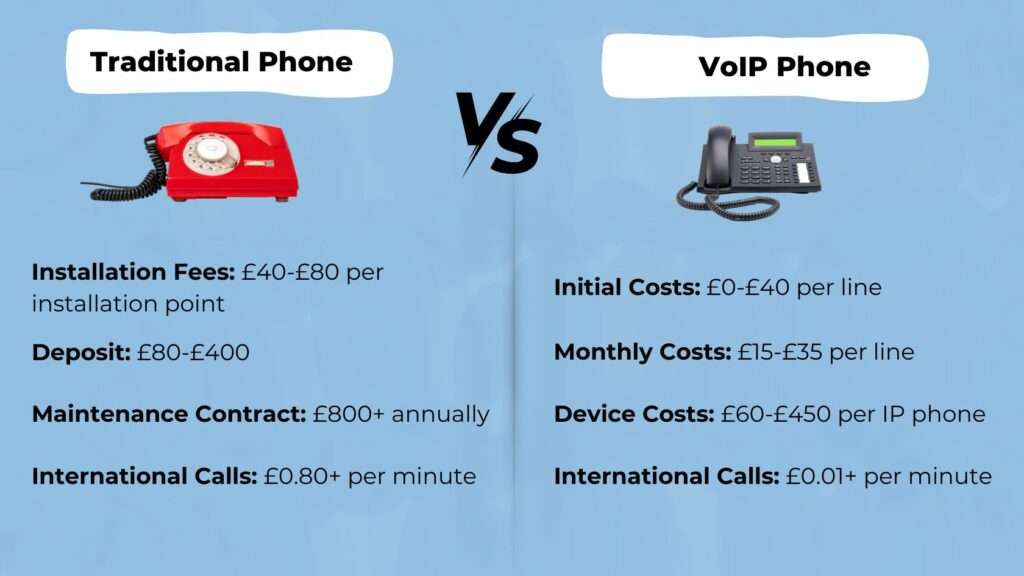Gone are the days of being tethered to a desk by a telephone cord. Enter the age of VoIP, a game changer in how we connect globally. VoIP, or Voice over Internet Protocol, transforms our voices into digital signals, allowing for calls to be made over the Internet rather than traditional phone lines.
Understanding the mechanics of VoIP is akin to unravelling a digital revolution that has reshaped our communicational landscape. The contrast between VoIP and landline phones lies in their functionality, infrastructure, and modern-day relevance.
In the forthcoming article, we will delve deep into VoIP, exploring its vast advantages, potential drawbacks, essential equipment needed, and how to select a provider that aligns with your needs. We’ll also spotlight the best VoIP phone system features and decode the technical journey from analog to digital.
How VoIP Works
Voice over Internet Protocol, or VoIP, is a cutting-edge communication technology that converts voice calls into digital signals to transmit over the Internet instead of using traditional phone lines. Below is an explanation of how VoIP works in a nutshell:
Voice Transmission: During a VoIP call, your voice is first recorded through a device such as a VoIP phone or mobile device equipped with VoIP software.
Digital Conversion: The analog voice signal is then converted into digital packets.
Data Routing: These packets are sent over the internet or any other IP-based network.
Signal Reception: At the receiving end, the digital data is reconverted back into analog or kept digital for VoIP to VoIP calls, allowing the recipient to hear the sender’s voice.

VoIP technology allows for features beyond voice calls, including video calls and video conferencing. It can operate on various devices such as smartphones, VoIP phones, or computers and also supports advanced functionalities like Interactive Voice Response (IVR) and Private Branch Exchange (PBX) systems.
What is the difference Between VoIP and Landline Phones?
In telecommunications, there’s ongoing dialogue comparing VoIP to traditional landline phones. The core difference lies in the transmission method. VoIP (Voice over Internet Protocol) services use internet connections to transmit voice data, whereas traditional landlines rely on dedicated copper wires for voice transmission. This distinction impacts several other aspects of their function.
Here are some key differences when comparing VoIP and landline phone systems. This comparison highlights VoIP’s technological advancements, ease of setup, and additional features, demonstrating its flexibility and efficiency against traditional landline services. Explore the differences in functionality and service offerings to understand better which solution might suit your needs.
| Feature | VoIP | Landline |
|---|---|---|
| Phone Calls (PSTN) | Yes | Yes |
| Nationwide Long-Distance | Included | Optional |
| User-to-User Calls | Yes | PBX Required |
| Caller ID | Yes | Yes |
| Call Waiting | Yes | Yes |
| Ease of Setup | ★★★★★ | ★★★ |
| Requires Internet | Yes | No |
| Wireless | Wi-Fi, DECT, Bluetooth | DECT, Bluetooth |
| Reliability during Outages | Calls routed to another number/voicemail | Calls drop or to voicemail |
| Technology | IP Telephony (SIP, TLS, SRTP) | Analog Voice Signals |
| Call Quality | ★★★★★ | ★★★★ |
| Advanced Features | ||
| – Auto Attendant | Included | PBX Required |
| – Phone Number Privacy | Included | Varies |
| – Phone Extensions & Hunt Groups | Included | PBX Required |
| – Conferencing | Included | Three-Way Calling |
| – Remote Work Capability | Yes, softphone apps | Call Forwarding |
| – Call Encryption | Yes | No |
| – Integrations (CRM, Text Messaging, Surveys) | Yes | No |
Traditional landlines use an established network of telephone lines, while VoIP uses modern broadband internet, supporting both voice and video. VoIP is generally more cost-effective, especially for international calls, as it routes them through the internet, often at competitive rates.

VoIP conferencing offers advanced features like video calls, conferencing, and IVR systems that traditional phones can’t support. It also provides greater flexibility and mobility, allowing users to connect via multiple devices such as smartphones and laptops, ideal for remote work. In contrast, landlines are fixed to one location and lack this portability.
Integration with other business systems is possible with VoIP, creating a unified communication solution, unlike landlines, which operate independently. During power outages, traditional landlines typically remain functional as they do not rely on power or the internet, whereas VoIP needs both to operate and may face service interruptions.
What equipment do you need to set up VoIP?
Certain equipment is essential to harness the benefits of VoIP for personal or business use. Here’s what you typically need:
Broadband Internet Connection: A stable and fast internet connection is a must-have foundation for VoIP. Without this, VoIP cannot function effectively.
VoIP Hardware:
- VoIP Phones: These look like regular phones but connect to the internet.
- Analog Telephone Adapters (ATA): This device can convert traditional phones into VoIP phones by connecting them to your internet network.
- Headsets: For users who prefer not to use a traditional phone setup, headsets can make VoIP calls via a computer or mobile device.
VoIP Service Provider: You’ll need to choose a provider that facilitates the conversion and transmission of your voice as digital signals over the internet.

Router and Modem: To connect to the Internet, a modem and router are usually required, and they are often provided by your Internet service provider.
Power Source: Unlike traditional phones that can draw power from the phone line, VoIP devices need a separate power source or an Uninterruptible Power Supply (UPS) to ensure they continue operating during power outages.
Computer or Mobile Device: If you’re not using dedicated VoIP hardware, you can place calls using any smart device with VoIP apps installed.
| Key Equipment | Explanation |
|---|---|
| Internet | A fast and stable broadband connection is required for VoIP service. |
| VoIP Phone or ATA | Devices for making VoIP calls, either designed for VoIP or adapted. |
| Router/Modem | ISPs frequently provide equipment to connect to the internet. |
| Power Source | Needed for VoIP devices to function, UPS recommended for power outages. |
| Smart Device | A computer or mobile device with a VoIP application is installed for calling. |
The setup for VoIP isn’t particularly complicated; most homes and businesses today already have much of the necessary equipment. With VoIP’s scalability, adapting or expanding your setup is usually quite straightforward, allowing you to customise your communications network to your needs.
Advantages of VoIP
Voice over Internet Protocol (VoIP) is a technology that has transformed how we communicate by turning traditional voice calls into digital signals that travel over the Internet. A significant advantage of VoIP services is the cost savings, particularly for international calls, as opposed to traditional phone lines where expenses can quickly accumulate. VoIP solutions often come with advanced features such as video calls, voicemail, caller ID, and call forwarding, usually at no additional cost.
Another key benefit is the flexibility it provides. VoIP phone systems allow users to make and receive calls on various devices, including VoIP phones, mobile devices, or even computers, making it an ideal choice for remote workers and businesses with a mobile workforce. Furthermore, VoIP’s ability to integrate with other applications and services, like Customer Relationship Management (CRM) tools, enhances productivity and efficiency.
Lastly, VoIP systems are scalable and can grow with a business without extensive physical infrastructure. Unlike traditional landlines, adding lines or features can be done with minimal disruption to the service. This ease of scalability makes VoIP a practical solution for small businesses and large corporations.

Disadvantages of VoIP
Voice over Internet Protocol (VoIP) transforms how we communicate, but it’s not without drawbacks. This technology relies on internet connections, so without a stable and strong broadband connection, call quality could be compromised, resulting in dropped calls or poor audio.
Moreover, during power outages, traditional phone lines continue working, but VoIP services often don’t, which can be a significant issue in emergencies when reliable communication is crucial.
VoIP also depends heavily on the devices used – from VoIP phones to mobile devices, and any malfunctioning equipment can disrupt service.
Additionally, while international calls are typically cheaper with VoIP, some users may still encounter variable costs, especially if calls are made to traditional landlines or mobile phones outside their service plan.
Finally, VoIP’s sophisticated features, though usually beneficial, can add complexity, which may require additional training for users to navigate effectively.
Best VoIP Phone System Features
Navigating the myriad of available VoIP features can be daunting. That’s why understanding the most beneficial functionalities is crucial when choosing the right VoIP system for your business. Features like an auto attendant, robust apps, crystal-clear call quality, and unified communication can streamline your operations and enhance your team’s ability to connect and collaborate. Moreover, security features like call encryption and practical tools like call recording can provide added protection and convenience. Let’s explore these top-tier features that set apart the best VoIP systems.
Auto Attendant
An auto attendant is a virtual receptionist that manages incoming calls for your business. It guides callers through a menu system and directs them to the appropriate department or individual, eliminating the need for a human operator. The auto attendant is a sign of professionalism and efficiency, helping to manage large call volumes easily and ensuring that callers are routed with precision without the longer wait times associated with traditional receptionist services.
Mobile and Desktop Apps
The capacity to make and receive calls from any location is not just convenient; it’s often essential for modern businesses. VoIP mobile and desktop apps empower employees to stay connected whether they’re at their desks, working remotely, or on the move. These apps often include features like contact syncing, chat, and video conferencing, making it possible to maintain seamless communication across various devices. Both remote workers and office-based teams can benefit from this versatility, which keeps everyone on the same digital page.
HD Call Quality
High-definition (HD) call quality ensures that every conversation is crystal clear, which is critical when communicating intricate details or holding important business discussions. VoIP technology can deliver superior sound quality compared to traditional phone lines. This clarity can significantly reduce miscommunications and the need for repetitive callbacks, providing both parties a more professional and pleasant auditory experience.
Unified Communications
Unified communications integrate multiple communication methods within a business, such as voice calls, video conferencing, messaging, and file sharing – all within a single platform. This integration fosters a collaborative environment that enhances productivity by streamlining communication and reducing the need to switch between different tools and platforms. It simplifies the user experience, bridging the gaps between various communication channels.
VoIP Costs in the UK

VoIP Costs in the UK VoIP offers significant capabilities at a low cost, making it a compelling alternative to traditional phone lines. For a typical VoIP setup, you might expect the following costs:
- Initial Costs: £0-£40 per line
- Monthly Costs: £15-£35 per line
- Device Costs: £60-£450 per IP phone
- International Calls: £0.01+ per minute
Taxes and additional fees will vary based on your location in the UK. These costs are significantly lower compared to traditional phone systems, particularly for businesses that require advanced functionalities and international calling capabilities.
Traditional Phone System Costs Traditional phone systems often come with higher and sometimes hidden costs, such as:
- Installation Fees: £40-£80 per installation point
- Deposit: £80-£400
- Maintenance Contract: £800+ annually
- International Calls: £0.80+ per minute
Given these expenses and the limited features of traditional landlines, VoIP is usually a more cost-effective choice for most organisations. To understand the exact pricing for VoIP services in the UK, it’s recommended to get a detailed quote that matches your specific business needs.
Call Encryption and VoIP Security
Security is a top concern for any communication system, and VoIP technology addresses this with features like call encryption. This feature encrypts voice data to secure and protect the calls from eavesdropping or interception. Furthermore, reputable VoIP providers will have robust security protocols to defend against cyber threats, providing peace of mind that your business communications are safe.
Call Recording
Call recording can be valuable for businesses, allowing them to record conversations for training, legal compliance, or quality assurance purposes. This feature makes it easy to revisit past discussions, provide a resource for staff training, analyse customer interactions, or simply keep detailed records of important agreements and discussions. The ability to record calls with clarity and ease is another advantage that modern VoIP phone systems offer over traditional telephone services.
By leveraging these advanced features, businesses can improve their communications infrastructure and gain a competitive advantage through increased efficiency, enhanced security, and reinforced connectivity. Whether utilizing a mobile device, enjoying HD call quality, or recording important discussions, VoIP technology continues redefining the standards and expectations for business communications.
Furthermore, integrating cloud PBX systems provides businesses with scalable and flexible communication solutions. Cloud PBX allows for seamless management of VoIP services, offering advanced features such as automated call routing, voicemail-to-email, and real-time analytics, thereby enhancing overall communication efficiency and effectiveness.
How to Choose a VoIP provider
When selecting a VoIP provider to upgrade from traditional phone lines, prioritise your needs with the following considerations:
- Provider Reputation: Choose a provider known for reliability and customer satisfaction. Research their history and customer reviews.
- Cost: Compare the costs of various VoIP service providers, considering any hidden fees for features or services you need.
- Features: Verify the availability of advanced features – like video calls, Interactive Voice Response, or mobile device integration – that benefit your business operations.
- Quality and Reliability: Look for high-quality voice calls and robust systems that ensure minimal downtime. Inquire about their measures during power outages.
- Scalability: Ensure the VoIP solution can grow with your business. Check if the provider supports adding lines or features easily.
- Customer Support: Evaluate the provider’s support system, focusing on their responsiveness to VoIP phone or service issues.
- Compatibility: Confirm if their VoIP systems integrate seamlessly with your existing infrastructure and support remote workers effectively.
- Security: Security protocols are crucial to protect your data. Ask about encryption and fraud prevention measures.
Choose a VoIP provider that aligns with these criteria and enhances your communication abilities through reliable internet connections, avoiding the limitations of traditional telephone services and landlines.
Analog to Digital: The (Short) History of VoIP
Voice over Internet Protocol, commonly referred to as VoIP, has revolutionised communication by enabling voice calls to be transmitted over the Internet. Diverging from traditional phone lines, this technology converts voice signals into digital signals that traverse the web or private networks.
| Milestone | Year |
|---|---|
| Origins of VoIP | 1995 |
| Mass Adoption | 2000s |
The genesis of VoIP dates back to 1995 when a company called VocalTec introduced the first internet phone. The initial version was rudimentary, but it planted the seed for a game-changing technology. By the 2000s, VoIP had begun gaining traction among businesses and consumers due to its cost-efficiency and integration of advanced features such as video calls and Interactive Voice Response.
The advent of broadband connections further spurred VoIP’s growth, providing the bandwidth for high-quality voice and video. Now, VoIP solutions, often provided by ITSPs (Internet Telephony Service Providers), are preferred by many, as they offer flexibility for remote workers and bring substantial savings for international calls. Despite concerns such as reliance on power sources and internet connectivity, which can be compromised by power outages, the convenience and advanced capabilities of VoIP services have cemented their role as formidable competitors to traditional telephone services.
Call Encryption and VoIP Security
Voice over Internet Protocol (VoIP) technology transforms voice calls into digital signals that traverse internet connections, enabling calls from a VoIP phone, mobile device, or computer. While this advanced tech brings cost-efficiency and flexibility beyond traditional phone lines, it also requires attention to VoIP security to safeguard data integrity and privacy.
One pivotal aspect of VoIP security is call encryption, a method used to protect voice and video calls from eavesdropping or interception. By encrypting data packets during transmission between devices, VoIP users can maintain confidentiality. Two main encryption protocols are often employed in VoIP solutions: Transport Layer Security (TLS) and Secure Real-time Transport Protocol (SRTP).
| Encryption Protocol | Function |
|---|---|
| TLS | Secures the signal channel for VoIP calls |
| SRTP | Encrypts the media stream (voice/video data) |
Yet, even with robust encryption, VoIP security must address potential threats like phishing attacks, malware, or denial of service (DoS). To counter such risks, reputable VoIP providers offer various security measures, including:
- Network security tools (e.g., firewalls, intrusion prevention system ss)
- Strong user authentication methods
- Regular security updates and patches
Always verify with your VoIP service provider to ensure comprehensive security protocols are in place to protect your communications.
Frequently Asked Questions
What is VoIP, and how does it work?
VoIP, or Voice over Internet Protocol, is a technology that converts voice calls into digital signals to transmit over the internet, instead of traditional phone lines. During a VoIP call, your voice is recorded, converted into digital packets, and sent over an IP-based network. At the receiving end, these packets are reconverted to deliver the sound.
What are the main differences between VoIP and landline phones?
VoIP uses internet connections to transmit voice data, offering features like nationwide long-distance calling, caller ID, and call waiting without additional costs. Traditional landlines rely on copper wires and typically require additional services like PBX for multiple features, making VoIP a more flexible and cost-effective solution.
What equipment is needed to set up VoIP?
To set up VoIP, you’ll need a stable broadband internet connection, VoIP phones or analog telephone adapters (ATA), headsets for computer or mobile device use, and a power source like an Uninterruptible Power Supply (UPS) for power outages. A router and modem are generally required to connect to the internet.
What are the advantages of VoIP?
VoIP offers significant cost savings, especially on international calls. It supports advanced features such as video calls, voicemail, and call forwarding at no additional cost. VoIP systems are highly flexible, allowing calls on various devices, and can integrate with other applications, enhancing productivity and efficiency.
What are the disadvantages of VoIP?
The main drawbacks of VoIP include dependency on the internet and power supply; in the absence of these, VoIP services may not function, affecting reliability in emergencies. VoIP also demands stable internet for high-quality calls and may involve additional costs when calling traditional landlines.
What are the best features of VoIP phone systems?
The top features of VoIP systems include auto attendants, mobile and desktop apps, HD call quality, and unified communications that integrate various methods like messaging, video conferencing, and file sharing within a single platform. These features enhance business communication and productivity.
How do you choose a VoIP provider?
When selecting a VoIP provider, consider factors like provider reputation, cost, available features, quality and reliability of service, scalability, customer support, compatibility with existing infrastructure, and security protocols like encryption and fraud prevention.
What are the costs associated with using VoIP in the UK?
Typical VoIP costs in the UK range from £0-£40 per line for initial setup, £15-£35 per month, and device costs from £60-£450 per IP phone. International call rates start at £0.01 per minute. These costs are substantially lower than traditional phone systems, which have higher setup and maintenance fees.
How does VoIP handle security and privacy?
VoIP security is crucial and includes features like call encryption to protect against eavesdropping. Reputable VoIP providers implement robust security measures such as firewalls, intrusion prevention systems, strong user authentication, and regular updates to safeguard communications.
Final Words
As we navigate the ever-evolving communication technology landscape, VoIP emerges as a pivotal player, transforming traditional phone systems into versatile, internet-based solutions. By leveraging the power of the internet, VoIP not only enhances call quality but also introduces a suite of advanced features that traditional landlines simply cannot match. VoIP technology caters to the dynamic needs of modern businesses and remote workforces, from seamless integration with other business tools to the flexibility of making calls from virtually anywhere.
The advantages of VoIP, such as cost efficiency, scalability, and the incorporation of cutting-edge features like HD video calls and unified communications, offer substantial benefits over traditional phone systems. However, the decision to switch to VoIP should be informed by a thorough assessment of your specific communication needs and the reliability of potential providers. With its profound impact on business communications and potential for significant cost savings, VoIP is a robust solution worthy of consideration.
We invite you to share your thoughts and experiences with VoIP technology in the comments below. Whether you’re considering the switch or have already embraced VoIP, your insights could be invaluable to others contemplating this digital transformation. What has been your experience with VoIP? What challenges and benefits have you encountered? Join the discussion and help others navigate the complex yet rewarding world of VoIP communications.


